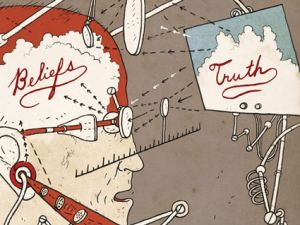On climate change, we’re politically polarized—which would be bad enough, but that’s not all. The hole we’ve dug is even deeper—as new research clearly suggests.
There’s yet another study out on Democrats, Republicans, and climate change, this time from Lawrence Hamilton of the Carsey Institute at the University of New Hampshire. Over the last two years, in a series of regional surveys, Hamilton asked nearly 9,500 people questions about climate change—from Appalachia to the Gulf Coast, and from New Hampshire to Alaska.
Across all these regions, he consistently found the following phenomenon: Democrats and Republicans who claimed to know less about the climate issue were more like one another in terms of whether they accepted the science. Democrats and Republicans who claimed to know a lot about the issue, by contrast, were vastly polarized—with knowledgeable Democrats overwhelmingly accepting the science, and knowledgeable Republicans overwhelmingly denying it.
“Political polarization is greatest among the Republicans and Democrats who are most confident that they understand this issue,” writes Hamilton. “Republicans and Democrats less sure about their understanding also tend to be less far apart in their beliefs.”
This core finding itself is not new—a 2008 Pew survey also found that Republicans with a college level of education were less likely to accept the science of climate than Republicans who lack such education. Other studies have also underscored this fundamental point. But for precisely that reason, Hamilton’s research kind of puts it in the realm of indisputable political fact. Not only are we polarized over climate change, but our knowledge and sophistication, when combined with our politics, make matters worse.
How could this be? For Hamilton, the explanation lies in the interaction between how we get information (from trusted news and Internet sources, we think, but we’re actually being selective) and our own biases in evaluating it (objectively, we think, but again, we’re actually being selective). “People increasingly choose news sources that match their own views,” Hamilton writes. “Moreover, they tend to selectively absorb information even from this biased flow, fitting it into their pre-existing beliefs.” In other words, we’re twice biased—based on our views and information sources—and moreover, twice biased in different directions.
Thus it really makes a lot of sense that those who are paying less attention to the climate issue, whether nominally Democrat or Republican, are less polarized and less sure of themselves. They’re not working nearly as hard at reaffirming their convictions, and refuting the convictions of the other side. (Hamilton’s study implies, though, that that they may have a different problem—they know so little that they may be more likely to be buffeted by the weather in terms of how they think about climate. If it’s hot out, maybe they’ll worry. If it’s cold, they’ll scoff.)
Overall, the big picture is that our society is not making up its mind in anything like a rational or scientific manner about climate change. That’s unfortunate–but it would be a form of denial itself at this point to reject the finding.
Subscribe to our newsletter
Stay up to date with DeSmog news and alerts






